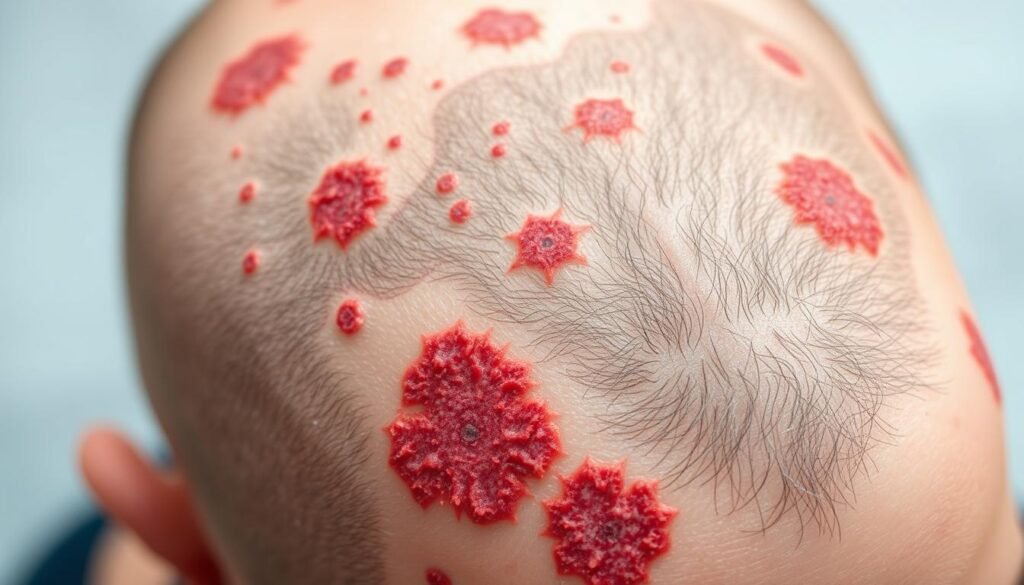About 125 million people around the world have psoriasis. Many of them suffer from an itchy scalp. This issue is not only about the skin you can see. It also leads to something called scalp psoriasis. This might look a lot like simple dandruff. But knowing the difference is very important for those with continuous itching and scaling.
This piece will look at why psoriasis makes your scalp itch. We’ll explore the signs, what causes it, and how to get better. Finding the right help for this issue is what we’ll focus on.
Key Takeaways
- Psoriasis affects around 125 million people globally.
- Scalp psoriasis and dandruff can present similar symptoms.
- Understanding these conditions is key to effective treatment.
- Itchy scalps can significantly impact daily life and self-esteem.
- Identifying the underlying causes can help in managing symptoms.
Understanding Psoriasis and Its Impact on the Skin
Psoriasis is known as an inflammatory skin disease. It changes the health and look of the skin. The immune system speeds up skin cell growth wrongly. This leads to too many cells on the skin’s surface.
Thick, red, scaly patches then appear. These patches are a clear sign of psoriasis.
The impact on skin is deep. It brings physical pain and can drop self-esteem. This happens because the scales are visible, itchy, and sore. Knowing this may help us understand the struggles of those with psoriasis, including itchy scalp issues.
Good care methods include scalp exfoliation. This gets rid of dead skin and calms the affected area. It keeps the scalp healthy. Understanding psoriasis helps people find the right help and treatment.
What is Scalp Psoriasis?
Scalp Psoriasis is a long-lasting autoimmune disease that mainly affects the scalp. This makes it different from other types of psoriasis. It is known for red, raised areas and shiny scales. People often find these Symptoms both uncomfortable and embarrassing.
Those with scalp psoriasis usually face several issues. They include scalings, red skin patches, and itchy or burning feelings. Sometimes, the hair may thin out where psoriasis appears.
To diagnose scalp psoriasis, a doctor will closely examine the patient. They look for specific signs and might do a skin biopsy. This helps them tell scalp psoriasis apart from other skin problems. Knowing the exact Symptoms helps in finding the right Diagnosis and treatment.
Psoriasis Causes Itchy Scalp
Understanding psoriasis and its effect on the scalp is key. It often gets compared to dandruff, which also causes flaking. However, they are quite different in how they appear and feel.
Connection Between Scalp Psoriasis and Dandruff
Dandruff can be confusing if you’re not sure what you have. It usually shows up as tiny, white flakes due to dryness or oil issues. On the other hand, scalp psoriasis involves larger patches. These are often red, inflamed, and more itchy than dandruff.
Symptoms and Signs of Scalp Psoriasis
It’s important to recognize scalp psoriasis symptoms early. Key symptoms of scalp psoriasis include:
- Red patches on the scalp
- Thick, silvery-white scales
- Severe itching
- Dryness and flaking of the skin
- In some cases, hair loss due to scratching or inflammation
Knowing these signs can lead to faster treatment. This is crucial for managing the condition well.
Exploring the Autoimmune Skin Condition
Psoriasis is a complex skin condition that involves the immune system attacking skin cells. This leads to scaly patches, often seen in Chronic Plaque Psoriasis. Understanding this can help explain why symptoms appear.
How Autoimmune Factors Trigger Psoriasis
The immune system sometimes acts up, causing psoriasis. This results in skin cells growing too fast. Knowing what triggers this can help manage the condition. Common triggers include infections like strep throat, skin injuries, cold climates, and certain medications.
- Infections such as strep throat
- Cuts, scrapes, or burns on the skin
- Cold weather or dry climates
- Certain medications, including lithium and beta-blockers
When these triggers occur, symptoms may worsen. Talking to doctors about managing psoriasis is key.
Chronic Plaque Psoriasis vs. Scalp Psoriasis
Chronic Plaque Psoriasis and scalp psoriasis both stem from autoimmune issues but look different. Chronic Plaque Psoriasis shows up as inflamed patches on the body. Scalp psoriasis affects the head, causing itchy flakes similar to dandruff.
They might be triggered by the same things, but treatment can vary. Understanding their differences helps in choosing the right treatment. For more information, you can check this source.

| Feature | Chronic Plaque Psoriasis | Scalp Psoriasis |
|---|---|---|
| Location | Affects various body parts (elbows, knees, trunk) | Specific to the scalp |
| Appearance | Red patches with silvery scales | Itching and dry flakes |
| Common Triggers | Infections, stress, injuries | Cold weather, certain skin products |
| Treatment Options | Topical treatments, systemic medications | Shampoos, topical corticosteroids |
Identifying Causes of Itchy Scalp
Dealing with an itchy scalp can be very bothersome. Knowing the Causes of Itchy Scalp is key to better handle it. There are many reasons for an itchy scalp, from things around us to certain scalp conditions.
What causes an itchy scalp? Here are some usual suspects:
- Allergies to hair products like shampoos or gels.
- Scalp psoriasis, which makes itchiness worse.
- Heat and high humidity that bother the scalp.
- Dry skin, which leads to flakes and itchy skin.
- Fungal infections causing a lot of discomforts.
Finding out what specifically triggers the itch is crucial. For example, if dandruff or psoriasis is the culprit, this can lead people to the right treatments. The right care can greatly improve life by reducing discomfort and boosting scalp health.
| Cause | Description |
|---|---|
| Allergic Reactions | Reactions to hair care items or dyes. |
| Scalp Psoriasis | A long-term condition causing dry, itchy areas. |
| Dry Skin | Not enough moisture, leading to flakes and irritation. |
| Fungal Infections | These cause itchiness and redness. |
| Environmental Factors | Things like heat, humidity, or pollution that hurt scalp health. |
How to Treat Scalp Psoriasis Effectively
To treat scalp psoriasis well, you need a mix of modern medicine and natural cures. People looking for relief try different ways, which help manage symptoms. Knowing what options exist can help pick the right one for their situation.
Biological Treatments for Scalp Psoriasis
Biological treatments look at fixing the immune system, focusing on inflammation causes. These treatments are now popular for serious cases of scalp psoriasis. Examples are:
- Adalimumab (Humira)
- Ustekinumab (Stelara)
- Secukinumab (Cosentyx)
These options aim to lower inflammation and help heal the skin, easing itchiness. Always talk with healthcare providers to make sure the treatment fits your health needs.
Natural Remedies for Scalp Psoriasis
Natural treatments can work well alongside medicines. Here are some favored natural remedies:
- Aloe Vera: Its soothing effect can help with hydration and irritation.
- Tea Tree Oil: It fights fungus and germs, possibly cutting down on flakiness and itching.
- Apple Cider Vinegar: When used right, it can help the scalp’s pH and lessen itchiness.
Adding these natural remedies to your day can bring calm relief, with few side effects compared to drugs.
| Treatment Type | Example Products | Benefits |
|---|---|---|
| Biological Treatments | Humira, Stelara, Cosentyx | Targets specific immune responses to reduce severity |
| Natural Remedies | Aloe Vera, Tea Tree Oil, Apple Cider Vinegar | Soothes irritation, hydrates scalp, and reduces flakiness |
Managing Related Conditions: Psoriatic Arthritis
Psoriatic Arthritis often starts in those who have psoriasis. It mainly affects joints, causing pain, swelling, and issues with moving. Knowing how Psoriatic Arthritis and scalp psoriasis are linked is key.
The signs of Psoriatic Arthritis can be different for everyone. They often include:
- Joint pain and stiffness
- Swelling in fingers and toes
- Reduced range of motion
- Fatigue and general discomfort
Managing scalp psoriasis and Psoriatic Arthritis well is important for a better life. Treatment usually involves systemic and biologic drugs. These focus on stopping inflammation in both skin and joints. Knowing about these treatments helps patients choose what’s best for them. For more details, check out this resource.
Adding lifestyle changes can also help control Psoriatic Arthritis symptoms. This includes regular exercise, eating well, and managing stress. These changes boost overall health and can also make your skin better.
| Symptom | Scalp Psoriasis | Psoriatic Arthritis |
|---|---|---|
| Joint Pain | No | Yes |
| Skin Plaques | Yes | No |
| Redness and Inflammation | Yes | Yes |
| Fatigue | Yes | Yes |
Ways to Soothe a Dry Flaky Scalp
A dry, flaky scalp can be uncomfortable and embarrassing. Luckily, many strategies can soothe dry scalp well. Using the right treatment can ease symptoms and make your skin healthier.
First, picking a good shampoo is key. Look for ones with salicylic acid or coal tar. Brands like Neutrogena and Psi-Care have these shampoos. Using them regularly can improve your scalp’s condition.

Creams and natural oils like coconut or tea tree oil can also help. They add moisture and calm irritation. Put these oils on your scalp to make it less dry and more comfortable.
Making lifestyle changes is important too. Drink lots of water to keep your skin flexible. Eat foods full of vitamins to help skin health. Omega-3 foods, like salmon and flaxseeds, are especially good for your skin.
If these methods don’t work, see a healthcare professional. They can suggest specific treatments for you, especially for serious symptoms.
Using these tips, you can start feeling better about your scalp. This will help you feel more comfortable and confident.
| Treatment Method | Key Benefits | Recommended Products |
|---|---|---|
| Shampoo with Salicylic Acid | Exfoliates and reduces flakiness | Neutrogena T/Gel, Psi-Care Anti-Dandruff Shampoo |
| Natural Oils | Moisturizes and calms irritation | Coconut Oil, Tea Tree Oil |
| Hydration | Maintains skin elasticity | Water, Herbal Teas |
| Omega-3 Rich Foods | Supports overall skin health | Salmon, Flaxseeds |
Conclusion
Understanding Psoriasis and its impact on the scalp is key for good scalp care. This article has helped readers understand how psoriasis can cause an itchy scalp. It has highlighted the link to dandruff and the autoimmune aspects that make it worse. Knowing the symptoms of scalp psoriasis helps people take action for better skin care.
There are many treatment options, like biological treatments and natural remedies. It’s important to find what works best for you. Talking to healthcare experts can help you get custom advice. This way, you can handle your symptoms well while keeping your skin healthy.
Good scalp care can greatly improve your life when you understand your condition’s causes. Using practical treatments along with holistic methods can boost your well-being. It leads to a healthier, more joyful scalp.